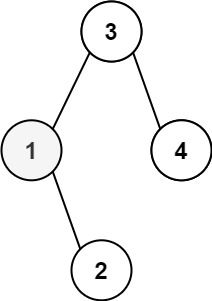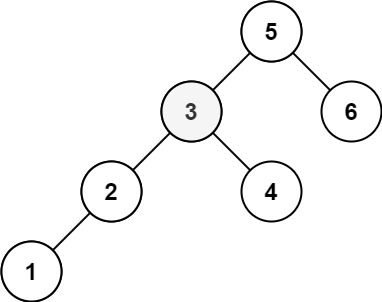Given the root of a binary search tree, and an integer k, return the kth (1-indexed) smallest element in the tree.
Example 1:
Input: root = [3,1,4,null,2], k = 1 Output: 1
Example 2:
Input: root = [5,3,6,2,4,null,null,1], k = 3 Output: 3
Constraints:
- The number of nodes in the tree is
n. 1 <= k <= n <= 1040 <= Node.val <= 104
Follow up: If the BST is modified often (i.e., we can do insert and delete operations) and you need to find the kth smallest frequently, how would you optimize?
# Definition for a binary tree node.
# class TreeNode:
# def __init__(self, val=0, left=None, right=None):
# self.val = val
# self.left = left
# self.right = right
class Solution:
def kthSmallest(self, root: Optional[TreeNode], k: int) -> int:
def dfs(root):
if root:
nonlocal k, ans
dfs(root.left)
k -= 1
if k == 0:
ans = root.val
return
dfs(root.right)
ans = -1
dfs(root)
return ans/**
* Definition for a binary tree node.
* public class TreeNode {
* int val;
* TreeNode left;
* TreeNode right;
* TreeNode() {}
* TreeNode(int val) { this.val = val; }
* TreeNode(int val, TreeNode left, TreeNode right) {
* this.val = val;
* this.left = left;
* this.right = right;
* }
* }
*/
class Solution {
private int k;
private int ans;
public int kthSmallest(TreeNode root, int k) {
this.k = k;
dfs(root);
return ans;
}
private void dfs(TreeNode root) {
if (root == null) {
return;
}
dfs(root.left);
if (--k == 0) {
ans = root.val;
return;
}
dfs(root.right);
}
}/**
* Definition for a binary tree node.
* public class TreeNode {
* int val;
* TreeNode left;
* TreeNode right;
* TreeNode() {}
* TreeNode(int val) { this.val = val; }
* TreeNode(int val, TreeNode left, TreeNode right) {
* this.val = val;
* this.left = left;
* this.right = right;
* }
* }
*/
class Solution {
public int kthSmallest(TreeNode root, int k) {
int ans = -1;
while (root != null) {
if (root.left == null) {
--k;
if (k == 0) {
ans = root.val;
return ans;
}
root = root.right;
} else {
TreeNode pre = root.left;
while (pre.right != null && pre.right != root) {
pre = pre.right;
}
if (pre.right == null) {
pre.right = root;
root = root.left;
} else {
--k;
if (k == 0) {
ans = root.val;
return ans;
}
pre.right = null;
root = root.right;
}
}
}
return ans;
}
}/**
* Definition for a binary tree node.
* struct TreeNode {
* int val;
* TreeNode *left;
* TreeNode *right;
* TreeNode() : val(0), left(nullptr), right(nullptr) {}
* TreeNode(int x) : val(x), left(nullptr), right(nullptr) {}
* TreeNode(int x, TreeNode *left, TreeNode *right) : val(x), left(left), right(right) {}
* };
*/
class Solution {
public:
int k;
int ans;
int kthSmallest(TreeNode* root, int k) {
this->k = k;
dfs(root);
return ans;
}
void dfs(TreeNode* root) {
if (!root) return;
dfs(root->left);
if (--k == 0)
{
ans = root->val;
return;
}
dfs(root->right);
}
};/**
* Definition for a binary tree node.
* type TreeNode struct {
* Val int
* Left *TreeNode
* Right *TreeNode
* }
*/
func kthSmallest(root *TreeNode, k int) int {
var ans int
var dfs func(root *TreeNode)
dfs = func(root *TreeNode) {
if root != nil {
dfs(root.Left)
k--
if k == 0 {
ans = root.Val
return
}
dfs(root.Right)
}
}
dfs(root)
return ans
}

